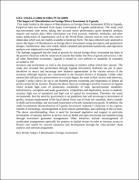| dc.description.abstract | IJEU ANGELA (2006-03 MBA PT 0112009)
The Impact of Liberalisation on Foreign Direct Investment in Uganda.
This study looked at the impact of liberalisation on Foreign Direct Investment (FDI) in Uganda. Empirical data was obtained from major Government of Uganda publications. The study used macroeconomic time series, taking into account sector performance, gross domestic product, imports and exports data. Other information was from journals, bulletins, textbooks, and other major publications of organisations such as the World Bank. Internet sources were also used to obtain data which was not readily available in hardcopy form. The data collected were analysed to assess the impact of liberalisation on foreign direct investments using descriptive and quantitative designs. Furthermore, data were coded, edited, tabulated and presented statistically and regression analysis was employed to test hypothesis.
The findings suggested that the trend of growth for inward foreign direct investment has been in the positive direction with the removal of controls that hinder free flow of goods and services. Like all other liberalised economies, Uganda is bound by core policies or standards of treatment accorded to 105
investors and investments as well as the functioning of markets within which they operate. The study also revealed that government through Uganda Investment Authority has put in place incentives to attract and encourage new business opportunities in the various sectors of the economy although majority are concentrated in the business district of Kampala. Unlike other nations that still practice protectionism to a certain degree for some of their sectors and industries, Uganda‟s policy allows for up to one hundred percent ownership and repatriation of almost all profits earned by the investor. Despite the above, there are challenges faced by investors in Uganda which include high costs of production, availability of land, macroeconomic instability, infrastructure, corruption and weak governance, competition and duplication, access to markets, taxation, high cost of operations and high cost of capital for investment. Therefore, the study recommends; first the need for government to set guidelines that will encourage re-investment of profits, increase employment of the local labour force, use of local raw materials, direct transfer of skills and knowledge, and increased exportation of locally manufactured goods. In addition, the study recommends decentralisation of Uganda Investment Authority‟s functions to the regions, transfer of technology, encouragement of joint venture partnerships, and widening of the tax base. The above notwithstanding, there is need for increased regulation and support to particular investments of national interest in sectors such as health and agro processing and manufacturing through investment guarantee arrangements. Other initiatives include encouragement of syndication arrangements especially for projects in similar sectors in order to increase access to finance and capital for onward expansion and development through the value-product chain analysis and outreach programme.
Key Words: Impact, Liberalisation, Foreign, Investment | en_US |


